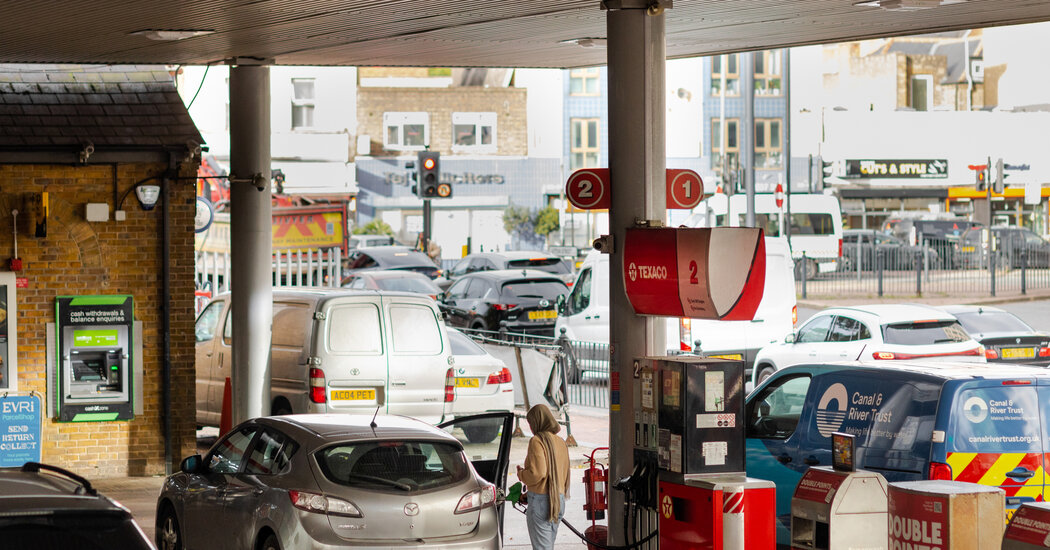Inflation in Britain fell from its highest level in 41 years on Wednesday, but the slowdown brings only limited relief for a country gripped by a deep cost-of-living crisis.
Consumer prices in Britain rose 10.7 percent in November from a year earlier, pushing the inflation rate down slightly from 11.1 percent in October, the highest annual rate since 1981, the Office for National Statistics said.
Despite this tentative sign that inflation may have reached its peak, UK households are being pressured by high energy bills, food costs and mortgage interest rates, while wage growth has failed to keep up with inflation. Based on data going back to the mid-1950s, the British will face the sharpest drop in living standards on record over the next two years. This leads to a growing wave of labor unrest. Railway and postal workers will strike on Wednesday over demands for higher wages, while nurses will quit their jobs on Thursday.
On a monthly basis, prices rose 0.4 percent in November, mitigating the rapid pace seen in October when they rose 2 percent in a month on higher energy costs, despite billions spent by the government to cut gas and electricity bills. restrict households.
Core inflation, excluding energy and food prices, slowed from 6.5 percent in October to 6.3 percent year on year. Economists had expected core inflation to remain stable, according to a survey by Bloomberg. A slowdown in transportation prices, particularly for fuel, as well as clothing and leisure services, all contributed to lower headline inflation, while rising restaurant and grocery prices partially offset this. Prices of food and drink rose by 16.4 percent in November compared to a year earlier.
Overall, Wednesday’s inflation data is “undoubtedly welcome,” Sandra Horsfield, an economist at Investec, wrote in a note. But “with consumer prices at 10.7 percent, inflation is still well ahead of average income growth, creating a pain that households can easily attest to.”
“There is still a long way to go before everything is clear about inflation,” she added.
The slowdown in headline inflation will be encouraging to policymakers at the Bank of England, which has raised interest rates sharply to try to dampen inflation. Inflation also slowed more than expected in the United States, according to data released on Tuesday.
But this is not enough for central bankers to declare victory as they target an inflation rate of 2 percent. Policymakers want to avoid the risk that high inflation will persist for years to come. They are alert to how much companies pass price increases on to customers and how much wages rise in response to a higher cost of living and a tight labor market.
Data published on Tuesday showed average wages in Britain, excluding bonuses, rose by 6.1 per cent year on year in the three months to October. While that is slower than the rate of inflation, policymakers argue that this increase in wages is still too high to be sure inflation can return to target sustainably.
Bank of England policymakers are expected to raise interest rates from 3.5 percent to 3.5 percent for the ninth consecutive time on Thursday. The half-point increase would match the Federal Reserve’s interest rate change on Wednesday and the expected increase by the European Central Bank on Thursday. All three central banks are expected to slow by three-quarters of a point from previous rate hikes.
Policymakers are expected to slow the pace of rate hikes as they assess the impact of months of monetary tightening in dampening economic demand to quell inflationary pressures. In Britain, rising central bank benchmark rates, up from 0.1 per cent a year ago, have already led to a notable rise in mortgage rates, with millions of households facing sharp increases in payments and payments next year. falling house prices.
While the inflation outlook is uncertain, the Bank of England forecasts that the pace of price increases will slow sharply from the middle of next year as past jumps in energy prices disappear from annual calculations.
But the costs of high inflation aren’t going away any time soon. The UK economy is likely already in a recession that the central bank says will last into next year. Household finances will come under “significant strain” from wage increases below inflation, higher mortgage payments and an expected rise in unemployment, according to a Bank of England financial stability report released Tuesday.
The Joseph Rowntree Foundation, a nonprofit organization, said on Wednesday that more than seven million households were “without essentials,” meaning they had reported going hungry or skipping meals or not having appropriate clothing, based on a survey. Just under five million households are said to be in arrears on at least one household account.
“I know it is difficult for many at the moment, but it is vital that we make the tough decisions needed to tackle inflation – the biggest enemy that makes everyone poorer,” said Jeremy Hunt, the Chancellor of the Treasury, in a statement following Wednesday’s inflation data. “If we make the wrong choices now, high prices will continue and prolong the pain for millions.”
This tough stance comes as government ministers have become embroiled in debates with unions over better wage offers after a long history of below-inflation wages. Recently, a large gap has emerged between them wage growth in the private and public sectors. Before inflation is factored in, private sector wages grew at an annual rate of 6.9 percent in the three months to October, but only 2.7 percent for public sector workers, data released Tuesday showed.
Pat Cullen, the CEO of the Royal College of Nurses, the union whose members will strike on Thursday and next week, accused the government of “belligerence” when talks broke down.

